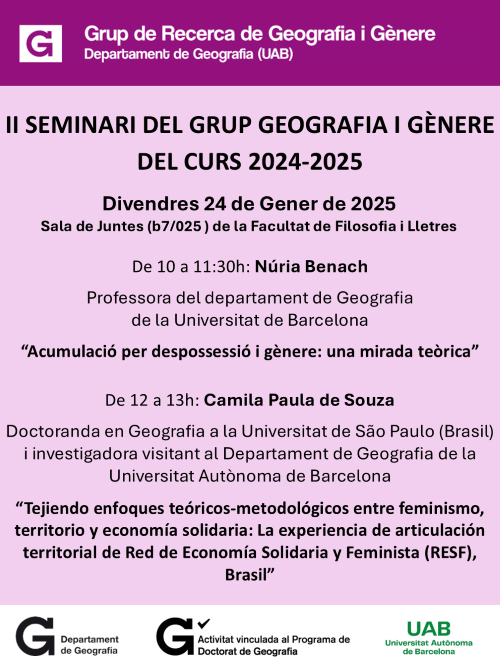II Seminar of the Geography and Gender Group for the 2024-2025 Academic Year
Event details
- Beginning: 24 January 2025
- 10:00 - 13:00
- Meeting Room (B7/025) Faculty of Arts and Humanities

Next Friday, January 24, the second seminar of the Geography and Gender Group for the 2024-2025 academic year will take place. The seminar will feature Núria Benach, Professor of the Department of Geography at the University of Barcelona and Camila Paula de Souza, D. candidate in Geography at the University of São Paulo (Brazil) and visiting researcher at the Department of Geography of the Autonomous University of Barcelona.
De 10 a 11:30h.
Núria Benach, Professor of the Department of Geography at the University of Barcelona
“Accumulation by dispossession and gender: a theoretical look”.
David Harvey reformulated Marx's primitive accumulation as accumulation by dispossession to analyze the extractive and redistributive dynamics of neoliberal capitalism. However, the connection between capitalism, colonialism and patriarchy have been addressed and theorized by authors such as Maria Mies, Silvia Federici or Nancy Fraser. These authors explain how gender submission and colonial exploitation have been the mainstays that have sustained the capitalist system from the beginning and, although in different forms, continue to do so today.
De 12 a 13h.
Camila Paula de Souza, D. candidate in Geography at the University of São Paulo (Brazil) and visiting researcher at the Department of Geography of the Autonomous University of Barcelona.
“Weaving theoretical-methodological approaches between feminism, territory and solidarity economy: The experience of territorial articulation of the Solidarity and Feminist Economy Network (RESF), Brazil”.
The process of labor restructuring resulting from neoliberal policies marked by the context of capitalist crisis unleashed a profound precariousness in labor relations, especially in gender relations and consequently altered territorial organization, thus configuring a constant territorialization of capital. Faced with this, some women's collectives and organizations have been guided by other ways of producing and living in society, such as the Brazilian case of the Solidarity and Feminist Economy Network (RESF). In light of the theoretical discussion on the sexual division of labor, it is possible to point out that labor relations have a sexual connotation when work functions and occupations are oriented according to supposed characteristics defined by gender, race and class. According to the Solidarity and Feminist Economy Primer developed by RESF, this context has led to the precariousness and devaluation of the work done by women and identifies that the path through a feminist methodology qualifies the solidarity economy and, in turn, is a possibility of repositioning women through income-generating activities. In this sense, we seek to present some results of the field work carried out with two local networks of the RESF together with the theoretical research of the authors that supports our study.
The organized activity is linked to the PhD in Geography.